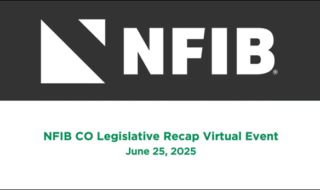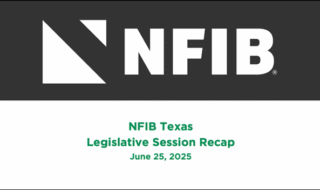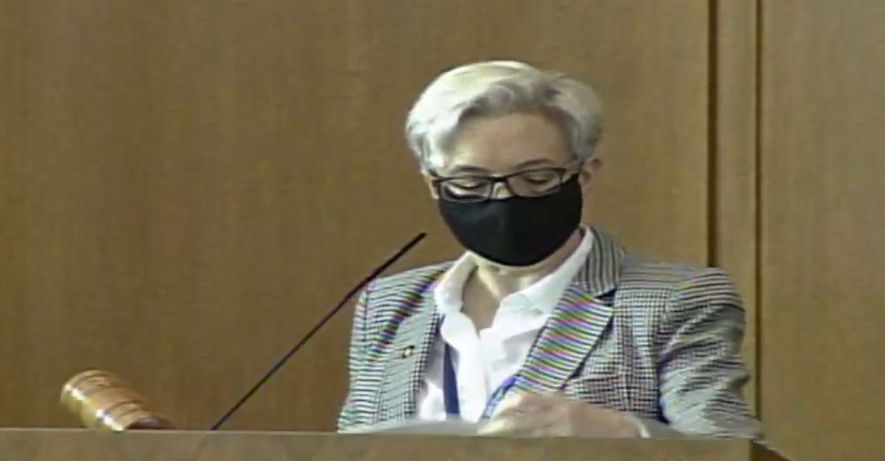February 26, 2021
Can Oregon Legislature Resist Ruining Rosy Revenue Picture?
State Director Anthony Smith reports from Salem on the legislative and political week ending February 26
It’s Day 39 of the 160-day Oregon Legislative Session and the last two weeks have seen a lot of activity in Salem – once the ice melted, that is. The Legislature halted all its work during the early part of last week after a historic ice storm hit the mid-Willamette Valley. Hundreds of thousands of Oregonians lost electricity service – some for a few hours, but many for days or even weeks. At least one bad bill, SB 483, which I mentioned in my last update, was canceled because of the storm and has not been rescheduled … yet.
Once legislators resumed their work, the pace picked up quickly and NFIB weighed in on five bills in four days – three tax bills and two bills relating to lawsuits and liability. But the big news of this week was the quarterly state revenue forecast. Surprise! Oregon has more money to spend and the Kicker is back in play. Here are the quick highlights, with more information below on each topic:
- State Budget/Revenue Forecast: Total resources available to the Legislature have increased by about $800 million since the last quarterly revenue forecast in December. That figure takes into account a projected personal income tax Kicker of $571 million.
- Tax Bills: Conversations surrounding the CARES Act disconnect and Oregon’s pass-through entity (PTE) tax rates continue. It’s still unclear what direction the Legislature will choose regarding these policies – or how fast things will move given the impact of the revenue forecast on the discussions.
- Lawsuits & Liability: It was a mixed bag of activity in the House Judiciary Committee’s Subcommittee on Civil Law this week. One bill might be the worst bill we’ve ever seen in terms of potential lawsuits against small businesses. The other would provide limited liability protections for businesses from lawsuits arising from the COVID-19 pandemic.
State Budget/Revenue Forecast
On February 24, the Oregon Office of Economic Analysis (OEA) presented its quarterly economic and revenue forecast before the House Committee on Revenue. Even though Oregon has lost about 160,000 jobs due to the pandemic, state revenues have bounced back in a big way. This is primarily due to the fact that the federal government has provided a massive influx of cash in the form of COVID-19 relief programs. Including everything passed last year and the bill that is currently moving in Congress, OEA estimates that Oregonians will receive a total of $12 billion in unemployment benefits, $11 billion in PPP funds, and $8 billion in stimulus money.
All those dollars have an enormous impact on state income taxes – so much so that OEA is now projecting that the state will bring in more money by the end of the 2019-2021 biennium (June 30, 2021) than it predicted would come in before the pandemic. In fact, OEA is now suggesting that Oregon taxpayers are on track for a Kicker refund in 2022 to the tune of about $571 million. That’s not a sure thing yet – but it should certainly make legislators think twice about adopting any retroactive tax increases that could impact General Fund receipts before June 30.
Tax Bills
A perfect example of a tax measure that the Legislature should not move forward this session is the proposed disconnection from three business-related tax provisions of the federal CARES Act. Aside from the reasons NFIB has highlighted in testimony during multiple public hearings on SB 137 and HB 2839, these changes to Oregon tax law would apply retroactively to January 1, 2021, and all but ensure that the Kicker kicks.
Likewise, Oregon’s pass-through entity (PTE) tax rate policy is under fire (yet again) in the form of SB 139, which would exclude certain industry sectors from benefiting from the lower tax rates and significantly lower the current income threshold cap of $5 million to $415,000. Unlike other approaches, which could reform the policy to achieve certain revenue-neutral policy goals, SB 139 simply raises revenue without a specific policy objective to justify the tax increase – and may prove to be completely unnecessary if Congress fills the remainder of the “budget hole” that state budget writers are expecting for the 2021-2023 biennium. (This is due to increased spending to maintain current service levels, not a reduction in revenue.) SB 139 had a public hearing on Feb. 25 in the Senate Committee on Finance and Revenue. NFIB testified in opposition.
A revenue-neutral approach might look something like HB 2604. This bill also received a public hearing on Feb. 25. The House Committee on Revenue heard testimony from NFIB and a few other organizations, but it became clear during the hearing that this measure would require additional analysis before NFIB and others could potentially support it. The bill creates two new lower tax rate brackets for business income of less than $75,000 and $150,000, respectively, and eases the eligibility requirements relating to hours worked by employees. NFIB testified in favor of these provisions but expressed our concern with the proposed income threshold cap of $500,000. As currently drafted, the bill is likely a tax increase overall, so some additional work on the rates and thresholds for each bracket is needed.
Lawsuits & Liability
The House Judiciary Committee’s Subcommittee on Civil Law heard two bills on Feb. 24. NFIB provided testimony on both – and issued an NFIB Action Alert on them the next day, so hopefully, you’re already familiar with these measures.
Modeled after a California law first enacted in 2003, HB 2205, the Private Attorneys General Act (PAGA) would allow individuals (and their own attorneys) the right to sue private businesses in the name of the state of Oregon for any violation that could result in a civil penalty. When NFIB surveyed our members in Oregon on this issue last year, nearly 95% of members opposed adopting PAGA legislation in our state, making this the #1 issue on the survey. Stopping this legislation will be one of our top priorities this year.
Conversely, when NFIB surveyed members in Oregon about liability protection for businesses operating safely and in compliance with state and federal guidance, 97% expressed their support for the legislation, making this the #1 issue on our most recent survey, conducted just prior to the beginning of the 2021 legislative session. HB 2638 would provide businesses with liability protection against frivolous lawsuits so long as they can demonstrate that the business was reasonably in compliance with state and federal COVID-19 rules and regulations. The concept is simple – if business owners are following the rules, they shouldn’t have to worry about being sued by members of the public claiming to have contracted the virus at their place of business. This is exactly what lawmakers should be working on right now. Let’s hope it gains some traction – and you can help with that. If you haven’t done so already, please TAKE ACTION on these two important issues!
Previous Reports and Related News
NFIB is a member-driven organization advocating on behalf of small and independent businesses nationwide.
Related Articles















